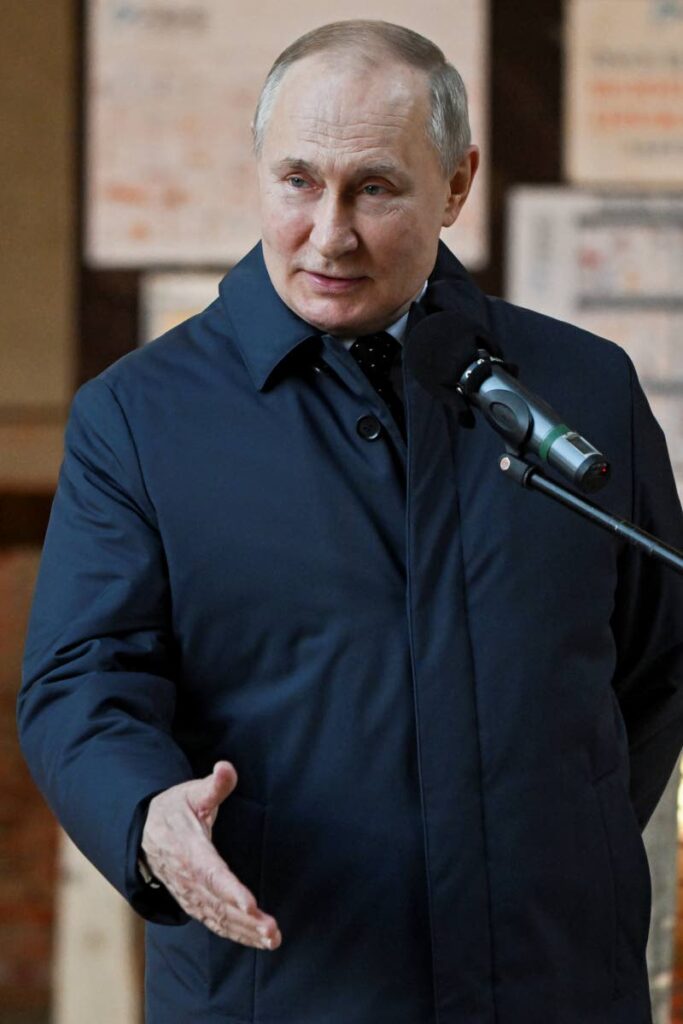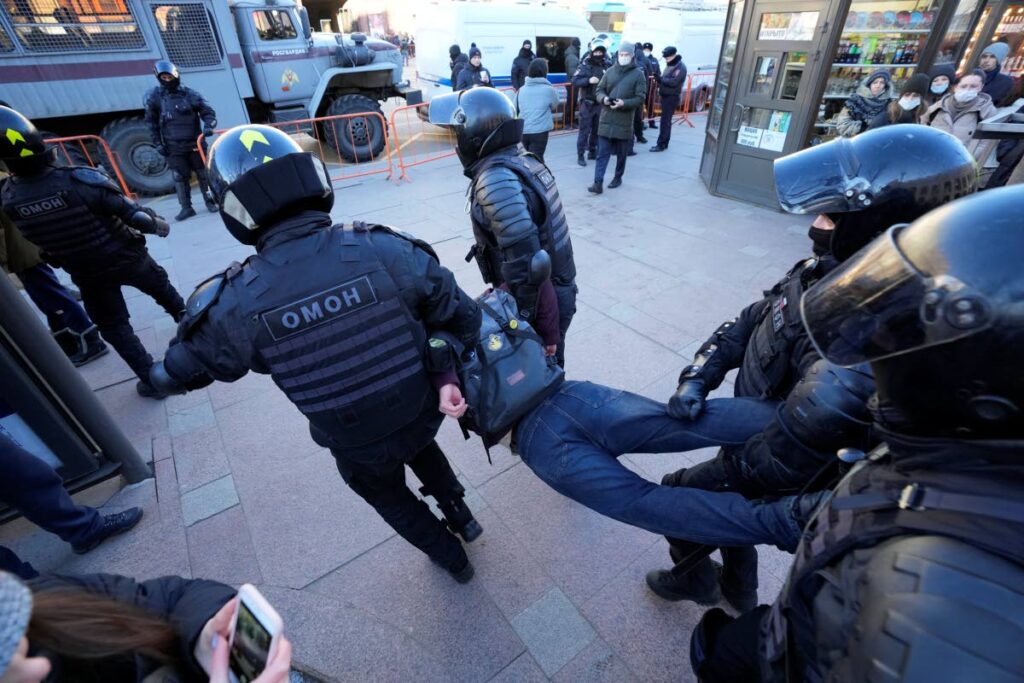Ex-IR head at UWI: Why Putin attacked Ukraine, where it might end up

WHILE the world awoke last Thursday to the shocking news of Russia's invasion of Ukraine on Wednesday night, the event did not surprise Dr Anthony Gonzales, former head of the Institute of International Relations at UWI, St Augustine, although he thought it ill-advised, he told Newsday on Thursday.
"I think President Putin has been talking about this for 20 years. He wasn't happy with how the Soviet Union broke up. He always had ideas.
"As NATO expanded he felt Russia was besieged, surrounded by all these countries that could put weapons. But that did not justify what he did."
Gonzales said Putin, a former KGB agent, had felt Russia got the worst part of the deal upon the USSR's disintegration and now feels a sense of that history. Despite the collapse of the USSR or "Russian Empire," Gonzales reckoned Putin believes Ukraine still belongs to Russia.

"He felt Lenin had made a mistake in 1917 in recognising nationalists in Ukraine, in accepting Ukraine as a republic within the USSR. Putin thinks they are all Slavic people."
He said even former Russian president Boris Yeltsin, a reformist, would never have expected Ukraine to separate, but stay with Russia.
Gonzales felt Putin was now trying to rebuild that union.
But, he said, "I think it is a lost cause. Ukrainians will fight until they get back some form of independence, but what kind of country that would be..."
Gonzales wondered whether Russia intended to occupy Ukraine and, if so, whether it would do so by installing a pro-Russia government or by splitting the country. "Ukraine will make it very difficult for them to occupy the place."
He said fighting could spread to nearby countries like Poland. "It could be very nasty, very rough. It has implications down the road.
"This invasion has a whole lot of ramifications, such as on the price of oil and wheat."
He said it will intensify Russia-West tensions.
Gonzales thought the crisis could have implications for Venezuela, such as reinforcing the Americans' determination that no Russian weapons must be placed in the New World, amid talks of any coming conflict between the US and Russia.
So, why now for Putin's invasion?
"Since 2014 when Ukraine threw out the pro-Russian government and wanted to go with the West in the Purple Revolution, Russia was very annoyed and took Crimea and the Donbass (the latter presumably via separatist proxies)."
Gonzales said since then, Putin has been looking to see how he could make a move to restore a Russian presence in Ukraine, amid the contrasting impacts of former US president Donald Trump and current President Joe Biden.
"He felt Trump would destroy NATO and so he would have nothing to do. But Biden decided to strengthen NATO. Putin saw that his chance to get back Ukraine was lost and now the only way to do so was by invading.
"NATO is stronger now than under Trump. They are beefing up NATO countries."
He queried any notion of Putin invading because the West was perceived as weak, but added that Russia has a very powerful army that can make life hard for nearby countries.
Gonzales was reminded of the 1962 Cuban Missile Crisis, where the US opposed the USSR seeking to place weapons in Cuba, close to the US, while likewise noting Russia's historical fear of invasion from the West, having been invaded respectively by Napoleon and Hitler.
"So Russia always wanted a buffer in Eastern Europe, to protect its borders."

Gonzales said if the West's nuclear weapons were moved into Ukraine they could easily hit Moscow, leaving very little reaction time by Russia. He said US missiles were in Lithuania, a former USSR member State, to Russia's chagrin.
Gonzales said Putin regards Ukrainians as his own people, given that both were Slavic people with historical ties. "But they have evolved as a nation and as an ethnic group separate and distinct."
He disagreed with the invasion, saying Russia must accept that Ukraine is an independent country and respect its borders.
"We'll have to wait and see how long they (Russian troops) will stay there. If they decide to hunker down and occupy the whole of Ukraine, it will be a long protracted kind of arrangement for them. "A lot of them (Russians) are going to get killed. I doubt they'll be able to hold that down for too long."
He said Russia's challenge was not to take over Ukraine but to occupy it for a long time.
"You'll have to station a lot of soldiers there and a lot will get killed." He reckoned Ukrainians could make surprise attacks by fighting back as insurgents based in nearby countries. "We have examples of Vietnam, Afghanistan and Iraq where it is difficult for you to win those kinds of battles.
"The Ukrainians have determined that they want to be a nation. They don't want to be part of Russia. They want nothing to do with Russia. They are tired of this kind of autocracy in Russia and all the corruption and all of that.
"They want to join the western countries and build some kind of democracy. You have this incompatibility, with Ukrainians not wanting to be part of Russia."
Asked if sanctions could sway Russia to pull out, Gonzales said Russians have a history of living through privations such as in World War II and afterwards, coupled with the impact of a strong nationalist pride, and could well be prepared to accept a lot of economic pain.
He also reckoned China might help Russia avert sanctions by selling to them. "But sanctions will bite a lot, affecting industry and creating shortages. It all comes down to what kind of pain people are prepared to bear."
He said most Russians live very modestly in small apartments and use trains, rather than a consumerist lifestyle. However he saw changes in their outlook on things in recent times and wondered if they would support or oppose the invasion.
"But you have to be strong to come out against Putin. You are likely to lose your life. If people are intimidated and afraid they won't come out. You could easily lose your life there if you are in a protest and so forth."
He said jailed opposition leader Alexei Navalny had spoken against the invasion.
Asked if the West might militarily confront the Russian Army, Gonzales said that would be crazy.
"The Americans do not want a direct confrontation with Russia. That would escalate into a nuclear war. They want to steer clear of that.
"They would help Ukrainians, giving them certain types of weapons to fight and along with sanctions would hope to bring Russia to its knees. It's hard to think of a continuous war in Ukraine that does not drag in surrounding countries. That's frightening.
"Both sides are aware of the dangers of a nuclear war and want to avoid that, so whatever they are doing they are trying to confine it to matters within Ukraine using conventional weapons."
He said a protracted war could go for ten-20 years with a lot of destruction and pain, and he did not know what that would mean for Russia.
Saying the Russians went into Afghanistan in 1979 and left in 1989 after losing too many troops, he reckoned the same will happen in Ukraine. "The Ukrainians will fight them. They (Russia) would be anxious to get some kind of settlement."
He said Ukraine might be willing to accept Russia taking the Donbass and Crimea area.
"All that is all subject to negotiation."


Comments
"Ex-IR head at UWI: Why Putin attacked Ukraine, where it might end up"